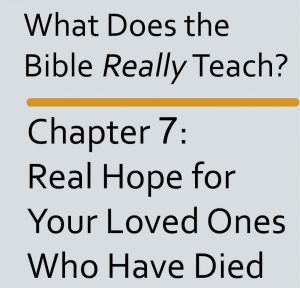Chapter 7, “Real Hope for Your Loved Ones Who Have Died,” and two related appendices explain what the Watchtower believes will happen to people after they die.
Christians don’t all agree on the sequence of end times events, so it’s only fair that I give you my views before critiquing the Watchtower’s. If your opinions are different than mine, you can make the necessary adjustments in your conversations with Jehovah’s Witnesses.
Unlike the Watchtower, I believe the Bible teaches that people have separate souls and spirits that surviving physical death. At death, the souls and spirits of the saved go to heaven to be with Christ (Philippians 1:23). The souls and spirits of the unsaved go to Hades to await the final judgment (Luke 16:19-31).
Resurrection is a reuniting of body, soul, and spirit (1 Thessalonians 5:23). Resurrection bodies won’t be identical to the bodies that died, but there will be continuity, as there is between a seed and the plant it produces (1 Corinthians 15:35-43).
There will be a bodily resurrection of both the saved and the unsaved (Acts 24:10). Although works have nothing to do with saving us (Romans 4:4-5), the saved will be rewarded at the judgment seat of Christ (2 Corinthians 5:10). The unsaved will receive gradations of punishment at the great white throne judgment (Revelation 20:11-15). These punishments will take place in the “lake of fire” (Revelation 20:15).
There will be two resurrections. The resurrection of believers will occur at or near the beginning of Christ’s millennial reign. The resurrection of unbelievers will take place at the end—1000 years later. (Revelation 20:4-6).
As you will see as you read Chapter 7 of “Bible Teach” and the related appendices, Watchtower teachings differ in very significant ways.
The raising of Lazarus
Paragraph 8 (page 68) states that “Jesus cried out with a loud voice: ‘Lazarus, come out!’” and his dead friend came back to life.
My question would be, “If the dead don’t hear or think and don’t exist, as “Bible Teach” said in Chapter 6, how could Lazarus hear him?” They may say that the actual raising occurred first. But the Watchtower’s translation of John 5:25 quotes Jesus as saying, “Most truly I say to you, the hour is coming, and it is now, when the dead will hear the voice of the Son of God, and those who have paid attention will live.”
Point out that apparently the dead do hear and think and are capable of responding to Jesus’ resurrection call.
Paragraph 9 (p. 68) says, “Jesus didn’t claim to be able to raise Lazarus on his own. His prayer in John 11:41-42 show that he was acknowledging Jehovah as the
Source of the resurrection.”
If you haven’t already covered with the Witnesses how Christ’s human subordination to the Father is not disproof of his deity, you can do so here. Pages 158-160 of The Jesus Is the God-Man Approach from my book, Getting Through to Jehovah’s Witnesses: Approaching Bible Discussions in Unexpected Ways, should be helpful.
You can also ask them to read aloud John 5:21: “For just as the Father raises the dead up and makes them alive, so the Son also makes alive whomever he wants to.”
Paragraph 11 (p. 70) repeats the Watchtower’s claim that Ecclesiastes 9:5 proves that the dead are conscious of nothing at all. I discussed that issue extensively in Chapter 6, and I invite you to reread that if you think that topic requires further discussion with the Witnesses. Further comments can be found in The Justice for the Wicked Approach (pp. 254-255, 262-264).
Paragraph 11 (p. 70) claims that the raising of Lazarus confirms its teaching that the dead are conscious of nothing. It asks, “Upon returning to life, did Lazarus thrill people with descriptions of heaven? Or did he terrify them with horrible tales about a burning hell? No. The Bible contains no such words from Lazarus. During the four days that he was dead, he knew ‘nothing at all.’ Lazarus had simply been sleeping in death.”
You can point out to the Witnesses that Lazarus didn’t tell people that he was conscious of nothing when he was dead. He isn’t quoted as saying anything about it one way or the other. So this is quite literally an argument from silence. In fact, Lazarus isn’t quoting as saying anything at all in the Bible. Does that mean that he was conscious of nothing during his entire life? Of course not. The focus of the passage is Jesus’ miracle, not Lazarus’ experience.
As far as Jesus’ reference to Lazarus “sleeping” is concerned, as I noted in my comments on Chapter 6, all that means is that he was using a euphemistic metaphor for death. The dead do look to us as it they are asleep.


Leave a Reply
Be the First to Comment!